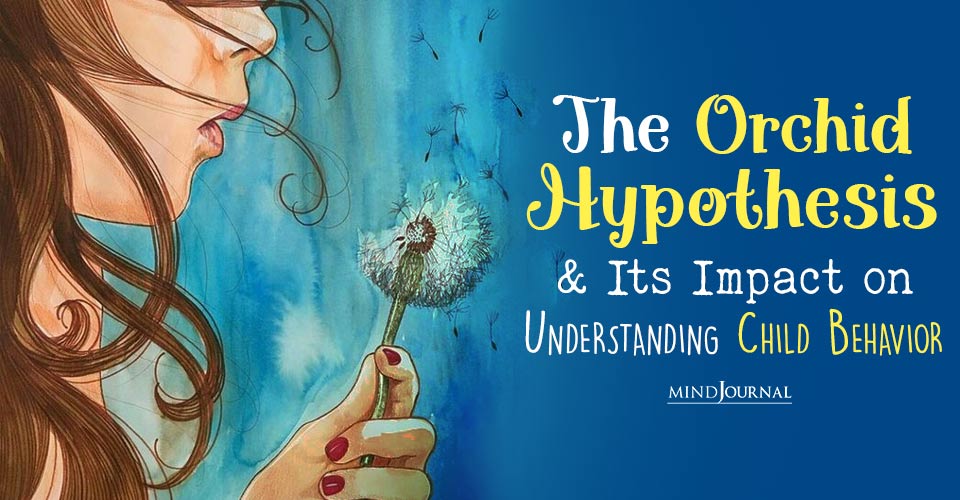Do you know what is Orchid Hypothesis? This theory holds the key to understanding why some children are better at handling stress, and some, are not so much.
What Is The Orchid Hypothesis?
Imagine a group of children going to school for the first time. You will notice that there are a few kids who are crying and throwing tantrums, while there are other kids who are excited and looking forward to the new experience of their first day in school.
Why are some of them so strong and others sensitive in the face of stress? Why do they have such disparity in behavior and difference in response to the same stimulus? After all, the experience of being away from home for the first time should be equally stressful for all of them.

Has it got anything to do with the genes? A lot of scientists and neurologists believe that sensitivity or persistence in the face of stress is determined by genes.
According to the Dandelion Orchid hypothesis, some children can be emotionally sensitive like an orchid and some can be comparatively more resilient like a dandelion during times of stress due to the absence or presence of certain genes.
However, Orchid Hypothesis also says that nurturance and proper care can help to undo the undesirable effects caused by genes to some extent and enhance overall child development.
Parenting Orchids And Dandelions: Why Some Children are Orchids?
The activity in the glucocorticoid receptor (GR) gene NR3C1 region determines how one responds to stress. The glucocorticoid receptor binds to the stress hormone cortisol and helps it to communicate with the rest of the body.
We need a moderate amount of cortisol for general functioning. During times of stress, the secretion of cortisol makes us alert to respond to the external environment.
But excessive secretion of cortisol can lead to panic and anxiety and might actually decline our performance, making us hypersensitive to stress.
A study on stress and behavior, conducted on children aged between 11 years and 14 years who have undergone childhood trauma, showed that they had reduced activity of glucocorticoid receptor (GR) gene NR3C1 which means fewer glucocorticoid receptors in their brains.
Fewer glucocorticoid receptors mean that excessive secretion of cortisol can’t be regulated in the body. Therefore, kids who have undergone childhood trauma can grow up to be individuals who are susceptible to large amounts of cortisol in their bodies, and hence they are more vulnerable to the effects of stress.
Childhood abuse or trauma can alter gene expression. There have been lots of studies to determine the effect of childhood trauma and abuse on the genetic makeup of a child.
Childhood trauma can be in any form ranging from maternal neglect during infancy years, separation or abandonment from parents during childhood, or /and physical or emotional abuse. Regardless, it can lead to the alteration of the glucocorticoid receptor (GR) gene expression.
Modification of this gene is believed to be the main reason that leads to increased sensitivity to stress. Therefore, according to the Dandelion and Orchid Hypothesis, children who have faced childhood trauma grow up to be adults with hypersensitivity to external stimuli of stress and suffer from panic or anxiety They are more prone to mental health issues.
Related: 5 Effects of Growing Up as an Unloved Child and How To Heal
Orchid Children and Dandelion Children

Any flower can grow beautifully and blossom into its fullest potential provided it is given the right conditions. The “Orchid child” can be nurtured to grow into a beautiful human being with strength and resilience by providing loving care and support.
Raising an orchid child in such a positive environment also minimizes the risks of these kids developing mental or psychopathological complications during the later years of their life.
Intervention programs, counseling, and psychotherapy can be helpful for children prone to stress. Several methods can be taken to help Orchid kids learn how to deal with stress and anxiety.
Children need tender love and support to build their confidence. When sensitive Orchid kids are nurtured and supported, they can grow up to be strong and resilient human beings.
When an Orchid kid blossoms and learns resilience, we have an exquisite person who is artistic, sensitive, and also strong, resilient, and confident.
Related: 13 Alternative Strategies To Discipline Your Child, Than With a Simple NO
We hope this post on Orchid Hypothesis and Orchid children’s stress was helpful to you. Is your child an orchid or a dandelion? Were you an orchid child or a dandelion child? What lessons did you learn while growing up as an orchid or a dandelion? Share your experiences in the comments down below!













Leave a Reply